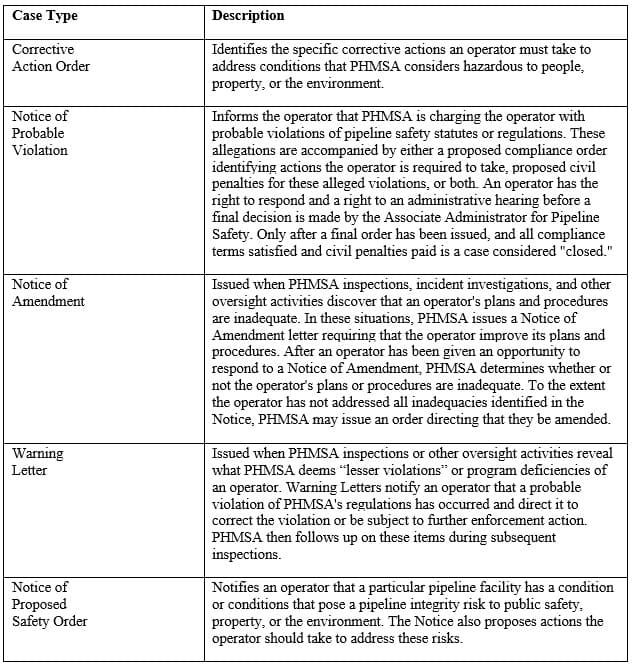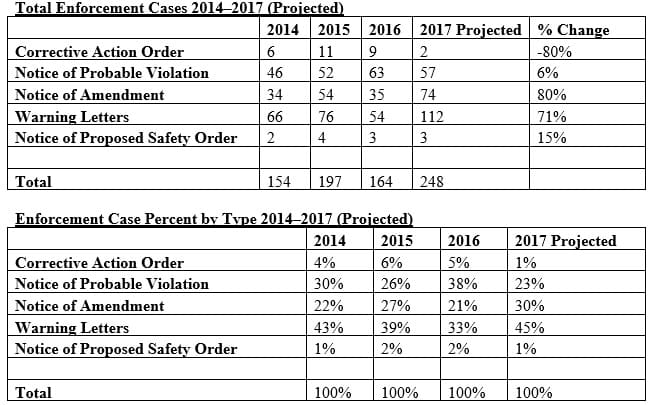The Pipeline & Hazardous Materials Safety Administration (PHMSA) has made good on its promise of stepped-up enforcement in 2017, especially against hazardous liquid pipeline operators regarding their policies and procedures as well as “lesser” violations or programmatic deficiencies.
According to its website, PHMSA initiated 144 new enforcement cases from January to July 2017 (for a projected total of approximately 248 this year). Compared to 164 cases in 2016, 197 cases in 2015, and 154 cases in 2014, this annual total would reflect a 44 percent increase over the prior three-year enforcement case average.
PHMSA tracks the following enforcement case types:

As shown below, the sharp uptick in enforcement filings appears to be attributable to an increase in Notice of Amendment and Warning Letter enforcement cases in 2017. Notice of Amendment enforcement actions are up by 80 percent versus the previous three-year average, while Warning Letter actions have increased by 71 percent.
The number of Notice of Probable Violations and Notice of Proposed Safety Orders are also projected to increase above the three-year average by 6 percent and 15 percent, respectively. Finally, although Corrective Action Orders may appear down this year, PHMSA typically files these actions later in the year, and so these cases will likely meet, if not exceed, prior years’ numbers. Notice of Proposed Safety and Correction Action Orders typically make a up a small percentage of enforcement actions, however, so these projected increases are not as concerning as the increase in Warning Letters and Notices of Amendment.
Further analysis of the 2017 Notice of Amendment and Warning Letter filings reveals the reason for the significant increase in these types enforcement activity: PHMSA’s apparently increased focus on hazardous liquid pipeline safety.
From 2014–2016, PHMSA filed an average of 41 Notices of Amendment against pipeline operators. As of July 2017, PHMSA has already filed 43 Notices of Amendment enforcement cases. Of these Notices, 17 were for gas or liquid natural gas pipeline operators, while 25 were for hazardous liquid pipelines. Should this trend continue, PHMSA is projected to file 74 Notices of Amendment, 29 for gas or liquid natural gas operators and 43 for operators of hazardous liquid pipelines. Although this projected number would be an 80 percent increase over the past three-year period, when Notices of Amendment filed against hazardous liquid pipeline operators are isolated, the difference jumps to 108 percent.
Similarly, from 2014–2016, PHMSA issued an average of 65 Warning Letters. As of July 2017, PHSMA had already met this average. Even more striking, however, is the fact that PHMSA is projected to increase the number of warning letters sent to gas and liquid natural gas pipeline operators by 14 percent, but the number sent to hazardous liquid operators will likely increase by 109 percent, to an unprecedented 60 such enforcement actions.
It appears that PHSMA is increasing its oversight of hazardous liquid pipeline operators, specifically regarding Warning Letters for “lesser” violations of pipeline safety regulations and Notices of Amendment for these operators’ plans and procedures. Such “lesser” violations include inadequacies in maintenance, inspection, and record-keeping, failure to adhere to policies and procedures, and a lack of adequate policies and procedures. Similarly, the majority of Notices of Amendment are related to failures by operators to maintain and/or adhere to adequate procedures for pipeline safety. The increase in PHMSA enforcement actions, therefore, appears to be directed at ensuring pipeline operators, particularly those who transport hazardous liquids, implement and follow required pipeline safety procedures, with the hope of preventing more significant – and potentially dangerous – violations in the future.
For more information, please contact Pipeline Practice team members; Elizabeth Brandon at Elizabeth.Brandon@btlaw.com or 214-258-4115; Paul Drucker at Paul.Drucker@btlaw.com or 312-214-8806; Michael Elam at Michael.Elam@btlaw.com or 312-214-5630; Jill Fortney at Jill.Fortney@btlaw.com or 312-214-4802; or Paul Garinger at Paul.Garinger@btlaw.com or 614-628-1454. You can also visit our Pipeline Practice online.
© 2017 Barnes & Thornburg LLP. All Rights Reserved. This page, and all information on it, is proprietary and the property of Barnes & Thornburg LLP. It may not be reproduced, in any form, without the express written consent of Barnes & Thornburg LLP.
This Barnes & Thornburg LLP publication should not be construed as legal advice or legal opinion on any specific facts or circumstances. The contents are intended for general informational purposes only, and you are urged to consult your own lawyer on any specific legal questions you may have concerning your situation.
Visit us online at www.btlaw.com and follow us on Twitter @BTLawNews.

















